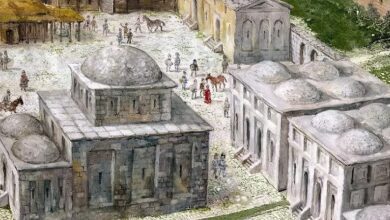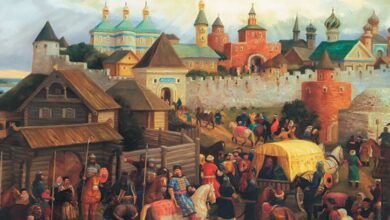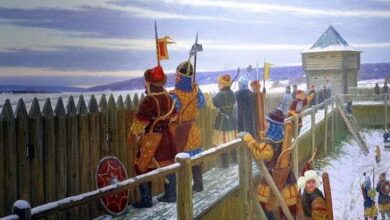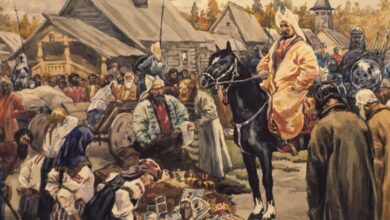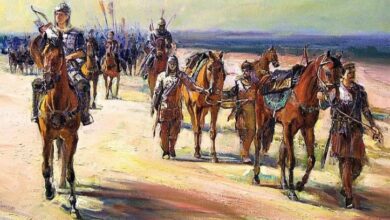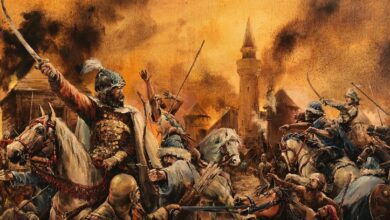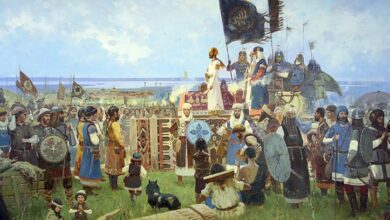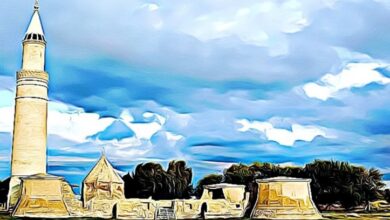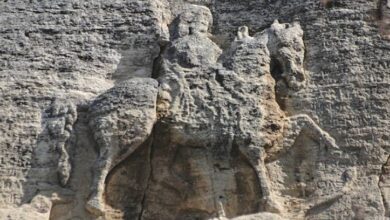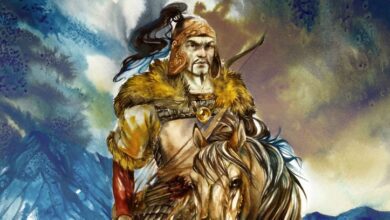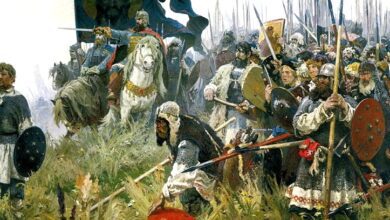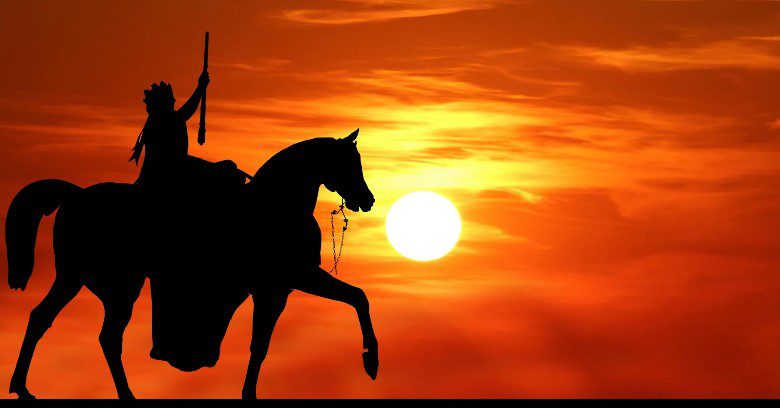
OThe Turan region around the Aral Sea was the first cradle of the ancient Turks. Later, the Ural-Itil region (Idel - Ural), the North Caucasus and the Northern Caspian became the next ancestral home of the Turks, where the Bulgar people, their civilization and statehood finally took shape and developed. This took place in the Bronze Age, between 4000 and 1500 AD. BC. The ethnonym "Bulgars" is interpreted as "black-headed", or "wolf people". Other phonetic variants of self-name are numerous: Bul, Bal, Bolgar, Malkar, Lokyr, Bulyar, Bilyar, Bukhar, Beger, Boyars, Bier, etc. All this is explained by the real presence of the cult of the Wolf among the Proto-Bulgars - Sindiu[1].
The common archaeological cultures of the ancient Bulgars were the Ancient Pit, Kurgan and Srubnaya on the East European Plain, in the Balkans and in Eastern Europe. And the Indo-European unity broke up in 3000 - 2000, and the Proto-Russians under the names of Saki, Reshentsy, Slovniki, Slavs, etc. the Germans - Slavs - Balts - Tokhars stood out from the tetra-unity somewhere around approx. 2000 BC and was in the neighborhood with the Turks as already agricultural peoples.[2]
The above-mentioned ethnonyms, respectively, originate: Saks - from the north Iranian tribe of Saks, who lived north of the river. Syr-Darya and then moved to the west, Reshentsy - from the verb "reshchi", i.e. "speak"; "Slovniki". - from the noun "word"; "Slavniki" - from "glory", since the Slavs praised their gods, Alps and heroes five times a day and drank surya, a sacred drink, three times a day. In heaven, they seemed to see mounted warriors of the modjars. Slavic and Bulgar singers composed their chants in their honor. According to the legend of the oldest Russian priestly chronicle called "Prinikanie", the self-name of the Rus comes from the name of the Urartian king Rusa I (734 - 711 BC), for whom they fought in the Middle East and who helped them return after long wanderings to their homeland, to the Volga and Dnieper, and form their civilization on the territory of Great Scythia (end VIII in. BC.).
Bulgar epic "Chulman tolgau" (II in. BC.)[3] testifies that 72 Bulgar or Oguz-Turkic-Saklan tribes lived around the Black Sea. The Proto-Bulgarians participated in the formation of the Cimmerian and Scythian civilizations of the East European Plain and Western Asia. Thus, both Indo-European and Türkic civilizations are friendly, Eurasian from time immemorial. The Turks wandered a lot, and the Indo-Aryans fought. The Volga - Ra - Oar - Var - Rudzhan - Idel - Turhan and Dnieper - Varukh - Borisfen - Tun - Burichay served as water arteries for both the Proto-Bulgarians and the Proto-Russians. There they met once at a good hour and became friends forever.
The Proto-Bulgarians, before the Proto-Russians, formed their state Idel after about 1512 BC. dzhabgusir (emperor) Bulyar Targitai populated Askyp - the Polovtsian Field - with Bulgars from Altai to the Danube. He settled the Arjan-Ulchis (Balts) to the north, and forbade attacks on Imen (eastern Poland), since the Bulgars lived there - Agadzhirs ("forest people").
The kingdom of Idel on the Volga was sometimes called by the name of the dynasties that ruled it: Mann, Kashdek, Kuman, Sarmat - Chirmysh, Alan, Hun Dulo I-th and IIth, Suvarskaya.
The Pra-Bulgars called the Pra-Russians on the Volga “as-Khaldzhoy”, and the Pra-Russians of the Pra-Bulgars called “Khalibs”, i.e. named after the legendary blacksmith, son of the god of war Ares Khalib, and were considered close friends. The Pra-Bulgars gave cattle to the Pra-Russians, and the Pra-Russians fought and defended their friends.
In "Chulman tolgaỳ" one curious legend has been preserved. Here is the text in Russian translation:
“One day, when young Bai-Timat
Was in the shape of a frog
Caught her violent
Khaladzhi children.
Following the example of adults
They mercilessly killed
snakes and frogs
And they considered it the height of valor.
But not all Khaljians,
But only Kara - the Khaljians
Killed snakes and frogs
And they were considered bad people.
According to the legend, the Proto-Bulgarians gave the children a bag of gold so that they would not torture the frogs and would not offend them in the future. The Prabulgars complained to the Agadjir kings and asked to resettle the Khaljis from them. And this happened in II millennium BC, in the Cimmerian time. The kings of Agadjir resettled one part of the Ak-Khaljians, led by the leader Rujaya, to Bista-Arjan, i.e. to the Baltic, from which the pra-Balts went. Another part of the people, led by Biris, was arranged next to Makidan, i.e. with Macedonia. These were the ancestors of the Illyrians. The third part, headed by Dzhalysh, settled in the region of Byrbat (“Lake Country”), which was located south of the Pripyat River and further to the Dniester, i.e. in modern Belarus and Ukraine. These were the ancestors of Belarusians and Ukrainians. The fourth part of the people, headed by the leader Balyn, was settled in the north-west of the kingdom of Idel, i.e. in Suzdal. These were the ancestors of the Great Russians.
This was the first line of the ethnogenesis of the Proto-Russians, coming from the Proto-Bulgars.
According to Chulman Tolgau, the ancestors of the Ak-Khaldzhians, the ancestors of the Volynians and Galicians, were peaceful, they bred horses and oxen and were engaged in agriculture. But, if the enemy attacked their land, then they took up arms and fought, as the legend says, excellently. And the Kara-Khaljians all remained in their places, since the Agadzhir kings valued them for their love of arms. The Khaljis, as warriors, yielded only to the Agadzhirs, the author of the legend claims. The Agadjirs called the Proto-Slavs "al-Khalij".
Returning to the topic of fighting frogs, the author of Chulman Tolgau writes as follows:
“The Khaljians didn’t like the ace
The cruel custom of the Kara-Khaljians,
But they preferred to endure it,
Remembering the words of Agaj:
"Kara - the Khaljians are submissive to us
And they give us bread and wood,
which we cannot
Extract in your steppe.
If we will
To hurt everyone
Then they will break
The jug of our kingdom."
The Bulgars always honored the testament of Jabgusir Agadzhi and were friends with the Proto-Slavs and Proto-Russians, their closest neighbors, in the great Cimmeria, Scythia, Kara-Saklan.
At the time when the Proto-Bulgarians were building their civilization in the great Chimeria and Scythia, the Proto-Slavs created their own in the depths of the Lusatian archaeological culture (1300-700 BC). This happened in the territories of modern Germany, Poland and the Czech Republic. It was the second proper Proto-Slavic line of ethnogenesis. During Przeworsk (IIin. BC. - Vin. AD) and Zarubinets (IIin. BC. - IIin. AD) archaeological cultures, the Proto-Russians separated from the Proto-Slavs and created their first state association of Volhynia and Mazovshans (IIin. BC. -IIin. AD). It was the first Russian-Polish state from the Vistula and Veprsha to the Western and Southern Bug.
This was the third line of the ethnogenesis of the Russes, coming secondarily from the Bulgars. The depth and multidimensionality of ethnogenesis, which took place on the territory of the great Scythia, Sarmatia, Kara-Saklan, consisted in the fact that many peoples and tribes turned into Reshchens - Slavs, or rather, into the Proto-Russians. It is not surprising, therefore, that the number of Ruses in Kara-Saklan has increased. So 300 peoples named by name by Herodotus and Claudius Ptolemy made up the population of Kara-Saklan, which turned into one people. He made up the population of the First Russian civilization. At the same time, the Bulgar civilization also existed in parallel, and the whole question was which of them would be the first to create a strong statehood.
Since then, the Rus and the Bulgars came into direct contact on the territory of Great Scythia. Jangi ibn al-Kimaki in "Description of the wonders of Akbash and Balynjar" (beginning XIIin.)[4] says that the state of "Great Bulgaria" (Ulug - Bolgar) was founded by Jabgusir Askyp Kuban Boyan (he is also a poet, collector of the epic "Chulman tolgaỳ") in 154 BC. e. The power included the following regions: Dzhalda (Crimea), Enegur (Eastern Black Sea region from the mouth of the Dnieper to the mouth of the Don), Jochi or Deremela (lands between the Dnieper and Don), Utig (Western Ciscaucasia).
The capitals of Ulug-Bulgar at different times were Rudzhan (Great Bulgar), Bulgar-Balik, Old and New Sundugachi, As-Banja (Fanagoria). Under the Sarmatian and Alanian dynasties, Great Bulgaria was either abolished or restored until the accession of the 2nd Hun dynasty, when the Jabgusir Bulumar (363-378) came to power. His grandson Attila created a huge empire from the Laba to the Volga - Gunnia Suba (432-453). Attila's son Bel-Kermek, also known as Irnik, in 475 restored "Great Bulgaria" under the name "Ak-Bulgar-Yorty". Russ and Bulgars lived in it together, without interfering with each other. It used to happen that in Bashtu (Kyiv) two rulers simultaneously ruled: the Bulgar khan and the Russian prince. As a result of friendly interaction, a mixed Bulgaro-Russian ethnic group was formed under the name "Bulgaro-Urus" of two varieties: some were bearded Uruses, and others were beardless Uruses, but they all spoke the Trek-Bulgar language and willingly responded to the name "Bulgars", which it was more pleasing to the god Tangra and his Alps. It is believed that the ancestors of this ethnic group were "Barsyl", they are in Russian - "Borus". Their ancestral home was the Mangyshlak Peninsula of the Caspian Sea, as well as the Urus region in the interfluve of the Urals and the Emba. At the beginning of a new era, the population moved from here to the west, to the mouth of the Volga, to the Dnieper, to the North Caucasus. Jabgusir Agarja Zurkapa (150-189) helped this resettlement, rewarding the settlers with money and lands. And the Bulgars - Uruses developed trade, fishing, agriculture, navigation and crafts.
About themselves, the Urus-Bulgars said this: “We are the Bulyars, that is, the Bulgars, and you are the Tumars”, i.e. "bog bumps" (Dzhangi Dzhanysh). The word "bulyar" meant "noble Bulgarin". “From this love of the Urus-Bulgars to the Kara-Ulchis (Slavs, Proto-Russians), - Dzhangi noted, - that incomprehensible for many cruelty of the Urus rulers of Iskel (Kievan Rus) to their own (simple) people, which consisted largely of Kara - Ulchiev (Slavs). But for the Ak-Bulgars (Volga Bulgars) Kara-Ulchis were the same Bulgars as they are.” The Proto-Russians recognized themselves as Slavs or Sarbs, as the Bulgars called them. They spoke Saklan, i.e. Proto-Slavic or Agil language "Prynikaniya", or "Veles book". But all the Proto-Russians understood the Trek-Bulgarian language “Saban”. After the settlement of the tribes on the East European Plain, the northern Russ called themselves "Bal - Rus", and the southern - "Mal - Rus", hence the later name of the ethnonyms: Belarusian and Little Russian. Other Bulgar tribes influenced the Rus: the Erdims - on the Radimichi, the Agadzhirs - on the Drevlyans, the Baylak - Bulgars - on the Polyans and Czechs, the Sebers - on the Northerners, the Baryndjars - on the Berendeys, the Kibya - Bulgars - on the bearded and beardless Uruses. And the Russian land in Travunia, Stenia, Gardaria was called Uruskala, and it was also the land of Turdzhan, or Troyan, "for the blood of our ancestors watered it abundantly" (Svyatoslav the Brave)[5]. ATVIIin. Rus' coexisted in unity with the Great Bulgaria, which was restored by Khan Kubrat (619-668). Svyatoslav of Kyiv considered the Bulgars and Rus' to be one state, and the Rus and the Bulgars to be one people, who should arrange a joint campaign against the Balkans. In his “Instructions”, Svyatoslav of Kyiv called: “So let’s move behind Uruskala to our Dzhurash steppes (to Dobruja) and we’ll fight for this our land like bakhadirs. We, the Uruses, have separated from Bulgarism, that is, we have separated from Slavic people, but we still want to be glorious people, and we have already shown this with our swords more than once. And again: “Kungosh (the Firebird) sings about this glory to us,” Svyatoslav continues, and the eagles shout everywhere that the Uruses are free and brave on land and in water, in forest and field. Not without reason, since the Cimmerian times, the eagle has been the emblem of our state. So ancient geopolitics relied on the historical self-awareness of the people. Svyatoslav the Brave remained faithful to the very idea - the Russian idea - to the end, and with it he died in the Dnieper rapids (972). It was loyalty to both Attila Audan and Kiy Iskem. And Svyatoslav of Kyiv was their successor and heir. He remembered the words of Zabergan, or Bir-Alan (VI c.): “So let’s go south beyond the Ijar (Danube), where the Bulgarian sheep of Atai (dzhabgusira IV in. BC) are grazing and for the treachery of our bloodsuckers-kryashts (Greeks) we will throw them out in the Ilat (Mediterranean) sea from Agil (Balkans) and take the whole Agil, abundantly watered with our Bulgarian blood. And if we don’t do this, then our descendants will curse us and reject Tangra and Narda from us, and we will hear such a roar from heaven, and such darkness will envelop our entire land that our cities and villages will turn over.
Imitating Zabergan (VI in. AD), Svyatoslav told the Russians this way: “And we would have to go get Dzhurash with his words, only take an oath before all this that if we get Dzhurash, then we won’t give him back to the Kryashs, and that it would be better if we all die there than We will return in disgrace. If we defend Djurash and Uruskala, make it united, rich and powerful, then our people will sing glory to us forever, and from Tangra we will receive great mercy even if your people are strong and numerous.
Gold words! They should be remembered by future generations if the Russians and Bulgars do not want to turn into slaves. After all, even before the conquest of Khazaria by Rus and Bulgaria in the mid-960s, it was said: “We now submit to the Khazars, as before to Ulug-Bulgar and Askyp,” Svyatoslav said, “and these are all the Bulgar powers and they are headed by the Bulgar tribes – our relatives, but these are all distant Bulgars who do not know our affairs and do not want to know. Here we want to return Djurash to give Uruskala a blissful life, but the Khazar khakan, bek Talib, does not allow us because of his friendship with the Kryash. Hence, frequent grievances arise between the Bulgars, and over the past 2000 years they have accumulated so much that it is better for us to start an independent life. If we do not become independent, then our heart will bleed from insults, and in our trouble we will only shed tears about our unfortunate fate. It's time to quit your disability and declare your right loudly and go to Jurash. Otherwise, we will become real slaves of our own and will forever vegetate in poverty, resentment and adversity.
So, the goals and objectives of the Balkan campaign were defined: a campaign against the Danube Bulgaria by the forces of two peoples. However, it was impossible to do without destruction in the rear of the Jewish Khazaria. Therefore, Svyatoslav considered the creation of a military-political union of Rus' with the Volga Bulgaria to be an urgent political task. And so it happened: Khazaria as a state in 965-966. was destroyed by Svyatoslav, and the Balkan campaign eventually ended in failure: the army was defeated, and the commander died. The Kyiv rulers relied on the creation of a powerful military organization.
Let's say a few words about the Ants and the Cossacks. The first detachments of professional warriors of the Ulchians - Ants - arose, approximately in IV in. AD in Ruskolani on the territory of Byrman in Ukra, i.e. between the Black Sea and the Dnieper, on the lands of the Tivertsy and the streets. They served the Bulgar khans and Russian princes and received money and land grants for their service, as well as freedom from paying tribute and taxes. For the duration of the service, the soldiers were forbidden to marry, and by the age of forty, the soldiers retired and were called "tama", and in Russian - "service class".
Free Cossacks were akin to ants. They were called Ukrainians, or Kirchirkes, i.e. "free riders". (Dzhangi-Dzhanysh). They "cossacked" in the same lands, and the cities of Byrlad on the Prut and Pereseken, east of modern Chisinau, near the Dniester, are called their capitals. The tales preserved one legend about the campaigns of Prince Bus the Young (IV in. AD)
The Anchis (Antes) were the most influential boyars of Galicia and Volhynia, the Kiev and Pereyaslav regions. A valiant Anchi, who accomplished feats on the battlefield, could be accepted into the suba of especially distinguished Uruses and take an honorable place at the kurultai - biys, or the council of princes. The contingent of the princely administration was also formed from the senior warriors, i.e. executive power. The acquisition of a military organization was an important factor in the development of the state structures of Ruskolani, Kievan Rus 1st and 2nd, the Russian Khaganate, the Russian beylik and the principality. It was also in Kara-Saklan and Ak-Saklan. True, the Volga Bulgars created another military mobile organization - an equestrian corps, or kursybay, of 6,000 horsemen. Anchians and Cossacks were common. Among the Russians, such military organizations were much more numerous and branched, with a true folk background: with heroes and heroic outposts who carried out border service under the great princes of Kyiv - Vladimir I and Yaroslav the Wise. When the Antian resource was exhausted by itself, then the stake was placed on hired warriors from the Varangians and Kolbyags, i.e. warriors of the Baltic and Scandinavia. All this played a role in strengthening the Russian and Bulgar statehood, which, however, did not lead to the formation of a single state and the consolidation of the people. Ethnic and religious differences were too great. The Russians looked intently at Byzantium with its Christianity, and the Bulgars - at the East and at Khorezm, and at the Baghdad Caliphate with their Mohammedanism. Confessional differences gave rise to many contradictions. In addition, the Khazar yoke existed in Uruskala even then. In 863, the people of Kiev raised an uprising against the Khazar government, which was then supported by the Bulgar administration. The uprising began with a skirmish between the Ants and the Khazar customs officers on the Pochaina, a tributary of the Dnieper, where the Church of St. Elijah the Prophet. The rebels ruthlessly destroyed the customs house, the Khazar quarter, and plundered the usurers. True, the El Jok mosque was not damaged. And the Baltavar Dzhilki, who misinterpreted the actions of the rebels, went to war against Bashta. Near Putivl, the Bulgarians defeated the Novgorodian army led by biy Turma, the son of Askold. During the battle, Turma was killed, it was not possible to besiege Kyiv. Baltavar Djilki realized that Kyiv was too hot a place for him, and he should leave it before it was too late.
Thus, the state of "Ak-Bulgar-Yorty", which was from 603 to 865, ceased to exist. Djilki with 10,000 troops and all the people moved from Kara-Saklan to the Middle Volga, to the city of Rudzhan, or the Great Bulgar, forever. Djilki took the name of Gabdulla and promoted the adoption of Islam by his people. By this, he finally alienated the Bulgars from the Russians and made their further peaceful contacts almost impossible. The fact is that the Russians began to lean towards Christianity: Dir was baptized in 830, and Askold, together with the people of Kiev, in 850. The first of them was the son of Prince Mezislav, and Askold was the son of Sigurd, the grandson of Gostomysl. After a long illness, Dir died (872). And Oleg the Prophet killed Askold (882). But the Kiev principality remained and expanded along the great waterway "From the Varangians to the Greeks", which united Kyiv and Novgorod, and thereby becoming Kievan Rus - 2. Since then, the confrontation between Rus' and the Volga Bulgaria began to intensify due to the struggle for territories: Kortdzhak, Deremelu, Shud and Biysu. In the state interests of Rus', it was also necessary to take possession of the Volga basin. This found expression in the wars of Vladimir I and successors of Yaroslav the Wise in XI - XII centuries This refers to the numerous campaigns of Russian princes - Vladimir-Suzdal and Novgorod - to the Volga Bulgaria. Former friendship was replaced by enmity and a long confrontation in XI – beginning XIIIcenturies, including because of the Polovtsy, relatives of the Bulgars, who did not give Rus' to Deremel and attacked the Russian principalities for almost 150 years. The apogee of this struggle came at the time of Grand Duke Vladimir II Monomakh, who sought to expel the Bulgar population from Kievan Rus - 2. Taking possession of Rus by the trade route along the Volga to the East - to Iran, Khorezm, Sogdiana and India - was an important strategic task, which had not yet been resolved.

